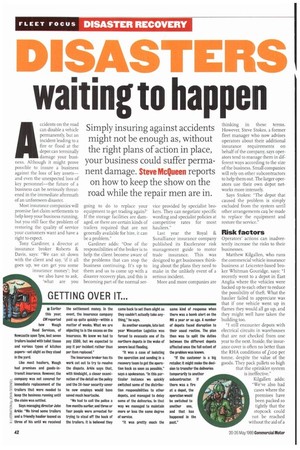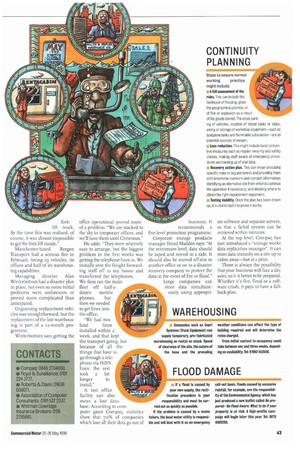DISASTERS waiting to happen
Page 44

Page 45

If you've noticed an error in this article please click here to report it so we can fix it.
Simply insuring against accidents might not be enough as, without the right plans of action in place, your business could suffer permanent damage. Steve Mcqueen reports on how to keep the show on the road while the repair men are in. Accidents on the road can disable a vehicle permanently, but an incident leading to a fire or flood at the depot can terminally damage your business. Although it might prove possible to insure a business against the loss of key assets— and even the unexpected loss of key personnel—the future of a business can be seriously threatened in the immediate aftermath of an unforeseen disaster.
Most insurance companies will promise fast claim settlements to help keep your business running, but you still face the problem of restoring the quality of service your customers want and have a right to expect.
Tony Gardiner, a director at insurance broker Roberts & Davis, says: "We can sit down with the client and say, `if it all goes up, we can get you some insurance money': but we also have to ask, 'what are you going to do to replace your equipment to get trading again?' If the storage facilities are damaged, or there are certain kinds of trailers required that are not generally available for hire, it can be a problem."
Gardiner adds: "One of the responsibilities of the broker is to help the client become aware of the problems that can stop the business continuing. It's up to them and us to come up with a disaster recovery plan, and this is becoming part of the normal set vice provided by specialist brokers. They can negotiate specific wording and specialist policies at competitive rates for most hauliers."
Last year the Royal & Sunalliance insurance company published its Excelerator risk management guide to motor trade insurance. This was designed to get businesses thinking about the plans they need to make in the unlikely event of a serious incident.
More and more companies are
thinking in these terms. However, Steve Stokes, a former fleet manager who now advises operators about their additional insurance requirements on behalf of the company, says operators tend to manage them in different ways according to the size of the business. Small companies will rely on other subcontractors to help them out. The larger operators use their own depot networks more intensely.
Says Stokes: "The depot that caused the problem is simply excluded from the system until other arrangements can be made to replace the equipment and restore the service."
Risk factors
Operators' actions can inadvertently increase the risks to their businesses.
Matthew Kilgallen, who runs the commercial vehicle insurance business at Leicester-based broker Whitman Gouridge, says: "I recently went to a depot in East Anglia where the vehicles were backed up to each other to reduce the possibility of theft. What the haulier failed to appreciate was that if one vehicle went up in flames they would all go up, and they might well have taken the building too.
"I still encounter depots with electrical circuits in warehouses that are not checked from one year to the next. Inside, the insurance cover is often no better than the RHA conditions of Doo per tonne, despite the value of the goods. They pack pallets so high that the sprinkler system is ineffective."
Kilgallen adds: "We've also had cases where the premises have been packed so tightly that the stopcock could not be reached without the aid of a forklift truck. By the time this was realised, of course, it was almost impossible to get the fork-lift inside."
Manchester-based Bergen Transport had a serious fire in February, losing 19 vehicles, its offices and half of its warehousing capabilities.
Managing director Alan Winterbottom had a disaster plan in place, but even so some initial problems were unforeseen or proved more complicated than anticipated.
Organising replacement vehicles was straightforward, but the replacement of the lost warehousing is part of a 12-month programme.
Win terbottorn says getting the office operational proved more of a problem: "We are stacked to the sky in temporary offices, and we'll have them until Christmas."
He adds: "They were relatively easy to arrange, but the biggest problem in the first weeks was getting the telephone lines in. We initially sent the freight forwarding staff off to my house and transferred the telephones.
We then ran the main fleet off half a dozen mobile phones, but then we needed to get lines into the office.
"We had two land lines installed within a week, and that kept the transport going, but because of all the things that have to go through a telephone via ISDN lines, the rest took a bit longer to install."
A lost office
facility can also NRUAANCF mean a lost data
base. According to com puter giant Compaq, statistics show that 70% of companies which lose all their data go out of business, It recommends a five-level protection programme.
Corporate storage products manager Donal Madden says: "At the minimum level, data should be taped and stored in a safe. It should also be moved off-site to another office or on to a disaster recovery company to protect the data in the event of fire or flood."
Large companies can store data simultane
ously using appropri
ate software and separate servers, so that a failed system can be retrieved within minutes.
At the top level, Compaq has just introduced a "storage works data replication manager". It can store data instantly on a site up to rokm away—but at a price.
There is always the possibility that your business will face a disaster, so it is better to be prepared. Whether it's fire, flood or a software crash, it pays to have a fallback plan.
GETTING OVER IT...
• Earlier this year. CM reported how Waugh Road Services, of Newcastle upon Tyne, lost seven trailers loaded with toilet tissue and various types of kitchen papers—set alight as they stood in the yard.
Like most hauliers. Waugh had premises and goods-intransit insurance. However, the company was not covered for F, immediate replacement of the
8trailers that were needed to keep the business running until
• the claim was settled.
2 Says managing director John tTs Ark le: We hired some trailers cc
▪ and a friendly haulier loaned us • three of his until we received the settlement money. In the event. the insurance company paid up quite quickly—within a matter of weeks. What we are objecting to is the excess on the Insurance. We knew we had to pay 1500, but we expected to pay it per incident rather than per item replaced."
The insurance broker has its work cut out to try to resolve the dispute. Arida says that. with hindsight, a closer examination of the detail on the policy and the 21-hour security cover he now employs would have saved much heartache.
We had to call the police a few months earlier. and three or four people were arrested for trying to steal off the back of the trailers. It is believed they came back to sot them alight as they couldn't actually take anything," he says.
As another example, late last year Wincanton Logistics was forced to evacuate one of its northern depots in the wake of severe local flooding.
"It was a case of isolating the operation and sending in a recovery team to get the operation back as soon as possible says a spokesman. "In this particular instance we quickly switched some of the distribution responsibilities to other depots, and managed to delay some of the deliveries. In that way we managed to maintain more or less the same degree of service.
-It was pretty much the
same kind of response when there was a bomb alert on the M6 a year or so ago. A number of depots faced disruption to their usual routine. The plan then was to split the duties between the different depots affected once the full extent of the problem was known.
"If the customer is a big retailer. it might make the decision to transfer the deliveries temporarily to another subcontractor. If there was a fire at a depot, the operation would be switched to another one, and that has happened in the past."
CONTINUITY PLANNING
Steps to ensure normal working practice might Include: A full assessment of the risks. This can include the likelihood of flooding, given the geographical position, or of fire or explosion as a result of the goods stored. The close parking of vehicles, location of diesel tanks or skips, wiring or storage of workshop equipment—such as acetylene tanks and flammable substances—are all potential sources of danger; ni Loss reduction. This might include basic preventive measures such as regular security and safety checks, making staff aware of emergency procedures and hacking up of vital data; Recovery action plan. This can mean allocating specific roles to key personnel and providing them with telephone numbers and contact information; identifying an alternative site from which to continue the operation if necessary; and detailing where to obtain the right replacement equipment; • Testing viability. Once the plan has been drawn up, it is vital to test it to prove it works.
WAREHOUSING
Companies such as Capri Systems (Truck Equipment) can supply temporary, pre-fabricated warehousing on rental ex-stock. Speed of clearance of the site. the nature of the base and the prevailing
weather conditions can affect the type of building required and will determine the rates charged.
From initial contact to occupancy could take between one and three weeks, depending on availability. Tel: 01P62 842046.
FLOOD DAMAGE
If a flood is caused by your own supply, the rectification procedure is your responsibility and must be carried out as quickly as possible.
If the problem is caused by a mains failure, the local water utility is responsible and will deal with it on an emergency
call-out basis. Floods caused by excessive rainfall, for example, are the responsibility of the Environmental Agency, which has just produced a new leaflet called Be prepared—Be Flood Aware. What to do it your property is at risk. A high-profile campaign will begin later this year. Tel: 0870 4002299.
CONTACTS
• Compaq: 0845 270400 • Royal & Sunalliance: 0151 224 3727.
• Roberts & Davis: 01638 608071.
• Association of Computer Consultants: 0181 537 2337.,
• Whitman Gowridge Insurance Brokers: 0116 2785881.




















































































































